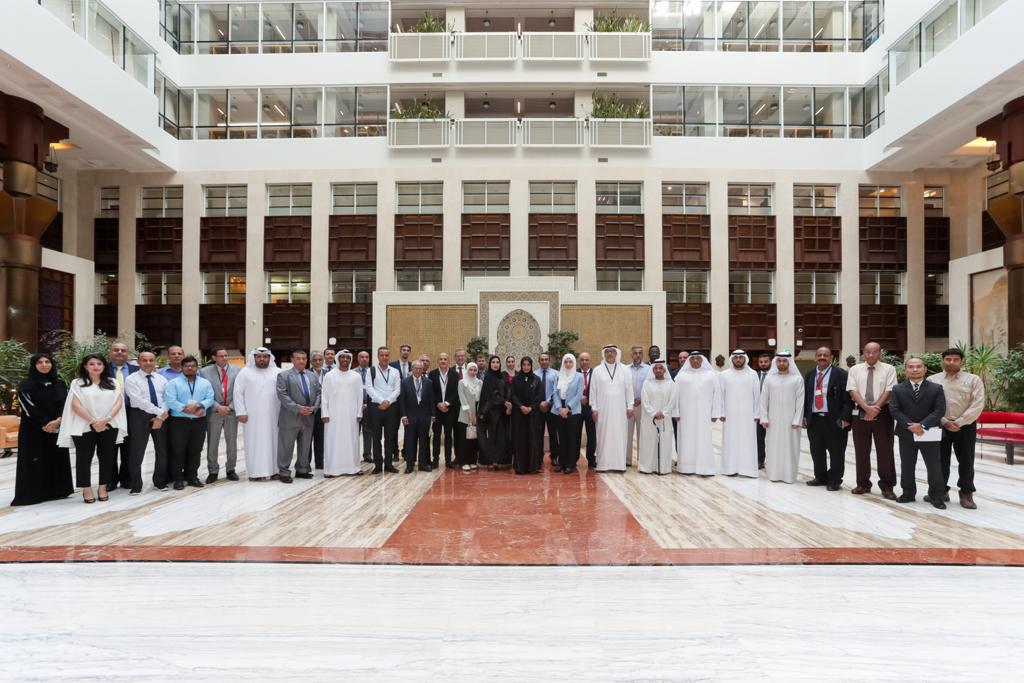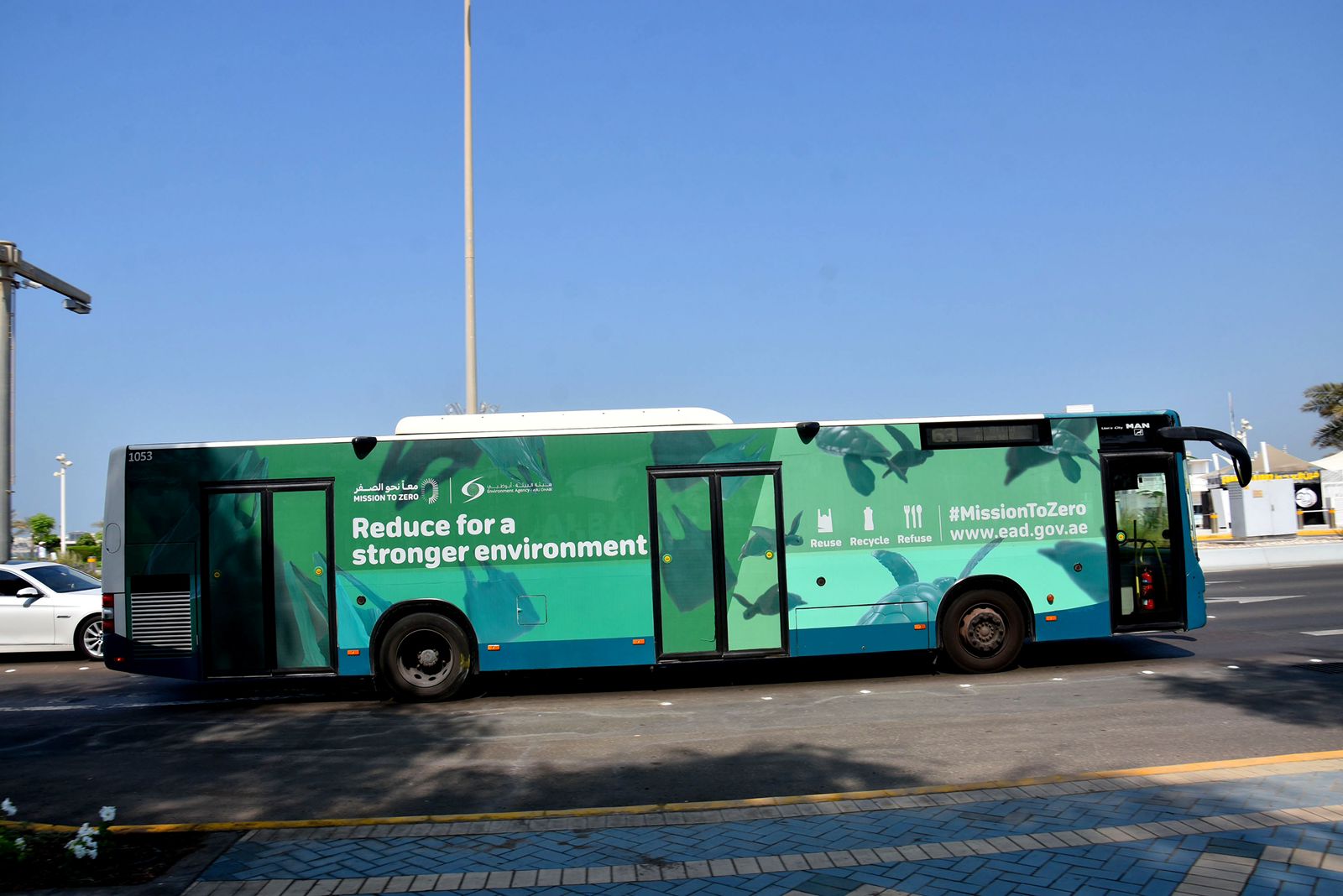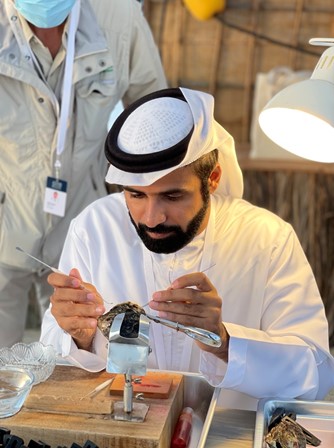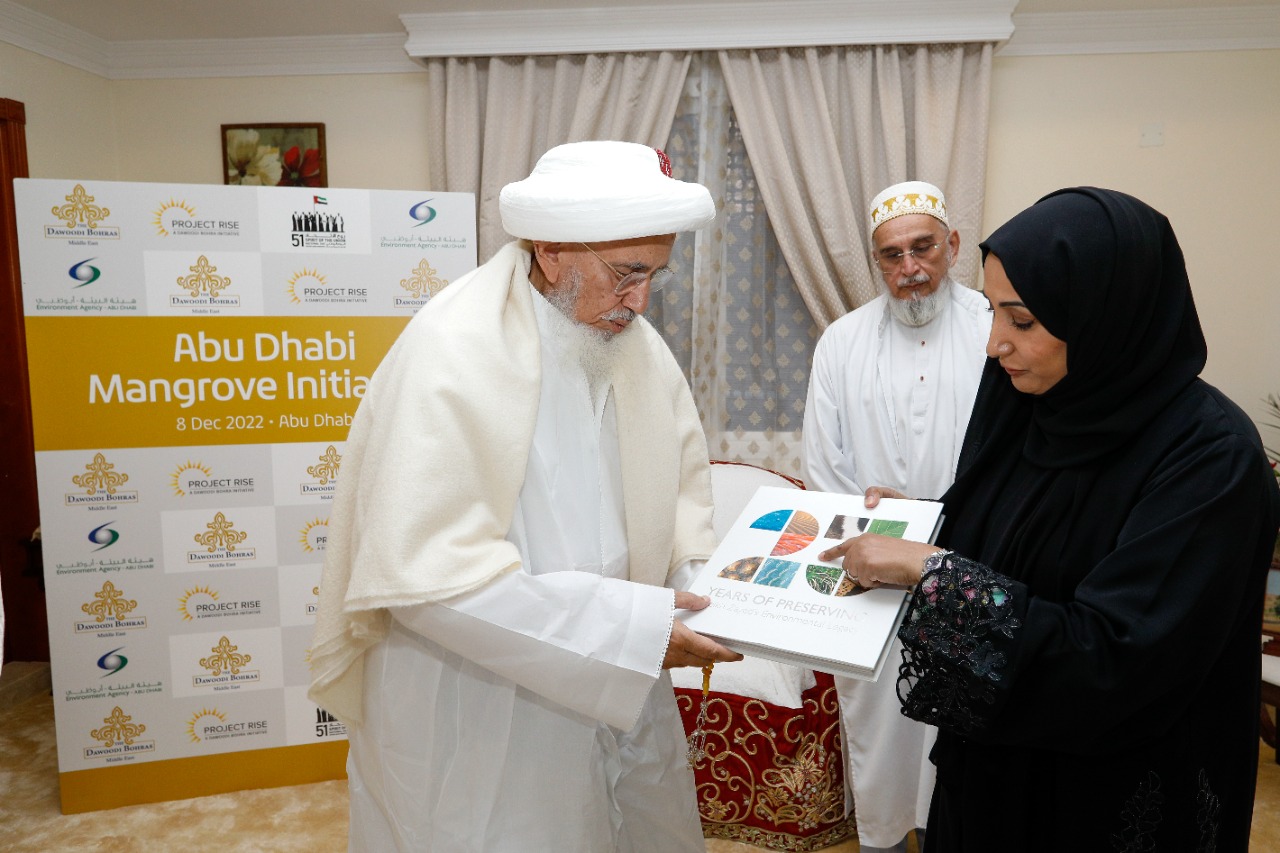



Priority 4
Ensure the conservation, Protection and Enhancement of our rich Biodiversity
4.1 Research , Conservation Restoration and sustainable use of Biodiversity
Our Key Success Measures :
. 90% habitat baseline area retained
. 21% of land , 21% of offshore water in protected area
. Improve status of all threatened species
4.2 Regulation Development and Enforcement for the Recovery and sustainable Exploitation of fisheries
Our Key Success Measures :
. Achieve 81% sustainable fisheries Exploitation index
. Achieve 30% mean relative stock size
. Achieve 30% Aquaculture versus wild catch

His Highness Sheikh Hamdan bin Zayed Al Nahyan, Ruler’s Representative in Al Dhafra Region and Chairman of the Board of Directors of EAD , praised the emirate’s achievements, led by the Agency, in the field of rehabilitation of coastal and marine ecosystems.
His Highness stated: “Abu Dhabi has confirmed its leadership and succeeded in strengthening its global position in the field of preserving the environment and protecting species, as well as implementing plans and programmes to restore and rehabilitate them.”
His Highness shared his comments on the occasion of the United Nations Environment Program’s announcement, which saw EAD-led programmes in Abu Dhabi named among the top ten list of global initiatives to restore and rehabilitate coastal marine ecosystems. The announcement was made on the sidelines of the high-profile meetings of the UN Biodiversity Conference (CBD COP15), which took place from December 13-17 in Montreal, Canada.
These programmes to preserve and rehabilitate coastal and marine ecosystems programmes were selected following evaluations conducted in accordance with UNEP’s standards and requirements, proving some of the most promising and ambitious and viewed as pioneering models at the global level. The selection was made from among more than 150 candidates from different countries, and approved by 70 government agencies, as a result of the Agency’s distinguished efforts in rehabilitating the unique biodiversity habitats of Abu Dhabi’s coasts and waters for endangered marine animal species and local communities.
Her Excellency Dr. Shaikha Salem Al Dhaheri, Secretary General of EAD, said: “Our marine habitats thrive despite the challenges they face due to high temperatures and increased salinity in the emirate’s waters – which is unique in a world where the effects of climate change are increasing. In light of the pressures that our natural habitats face due to the rapid development in the region, as well as coastal development activities and projects related to housing, tourism and infrastructure – which have impacted critical coastal and marine habitats – we have taken proactive measures to balance the requirements of economic and social development, sustainable exploitation of resources, and the development of rehabilitation initiatives and ecosystem restoration within the framework of the emirate’s plans and strategies.”

His Highness Hamdan bin Zayed, in his capacity as Chairman of EAD, has approved Executive Regulation for Environmental Assessment and Licensing. The Executive Regulation aims to ensure a healthy and safe environment for the population, protect the environment, and preserve natural resources.
The regulation aims to organise and improve the agency’s procedures in the field of environmental assessment and licensing of establishments, projects and activities that are subject to environmental licensing, inspection and enforcement. This is in addition to regulating the accreditation and registration of environmental consultancy offices working in the field of environmental consultancy, studies and research. The framework also covers the work of these offices, to monitor their efforts in order to provide the best environmental consultations and studies. The provisions of the regulation apply to all facilities, projects, activities, strategic projects, strategic plans, and programmes that may have an environmental impact.
Her Excellency Dr. Shaikha Salem Al Dhaheri, EAD Secretary General, said: ‘’The issuance of the executive regulation regarding environmental assessment and licensing is in line with the vision of Abu Dhabi to continue improving environmental management in the emirate. This regulation crowns ongoing efforts to ensure the continuity of development in the emirate in alignment with the regulation. We aim to improve and protect the environment in the emirate Eng. Faisal Al Hammadi, Acting Executive Director of the Environmental Quality Sector at EAD, said: “EAD has started implementing the requirements of the regulation after preparing plans that include many procedures and initiatives that will roll out in the next few years. This will help facilities to obtain an environmental license and attract investment. At EAD we will also assess the impact of implementing the regulation in a way that ensures it achieves its declared long-term objectives.

EAD has signed a memorandum of understanding (MoU) with The Cyprus Institute and the Max Planck Institute for Chemistry, Germany, regarding cooperation on a major atmospheric research project named Atmospheric Research Expedition to Abu Dhabi (AREAD).
The agreement will see an EAD research vessel fitted with advanced monitoring equipment supplied and operated by researchers of the Climate and Atmosphere Research Center (CARE-C) of The Cyprus Institute, a leading regional Center of Excellence for air pollution and climate change research, and the Max Planck Institute for Chemistry, a leading research institute focusing on chemical processes in the Earth system.
Led by the Agency, the parties will collaborate on an oceanographic air quality and climate change monitoring expedition – a world-first that will cover three continents and eight major bodies of water, from the Atlantic Ocean to the Arabian Gulf covering a distance of more than 10,000 km. Around 30 high-profile experts from the 3 parties are involved in this expedition.
Sailing off the coasts of 25 countries, starting in Spain and ending in the UAE, the epic scientific undertaking will add valuable new data and contribute significantly to our understanding of coastal and marine air quality and climate change. More than 22 different parameters will be monitored, including air quality regulated parameters, greenhouse gas concentrations, as well as volatile organic compounds and aerosol properties.

The project, which is the last step of the rehabilitation cycle before the marine animals are released back into the sea, is an extension of the EAD’s Wildlife Rescue Program in partnership with The National Aquarium, in line with Abu Dhabi’s existing conservation efforts to prepare the animals for release into Abu Dhabi’s waters in 2023.
Reflective of the sea turtles’ natural habitat, Louvre Abu Dhabi was chosen as a suitable rehabilitation area for the marine animals to exercise and acclimatise in preparation for their eventual release. The area will be accessible to visitors, who can gain insight into the rehabilitation of the turtles through exhibits, workshops and curated events.
HE Dr. Al Dhaheri, , said: “We are very excited about this partnership with DCT Abu Dhabi for the establishment of a turtle rehabilitation area at Louvre Abu Dhabi. This project is a testament to the increased interest in environmental conservation and protection of our precious biodiversity by other government entities and highlights Abu Dhabi’s leading position as a centre for the propagation of species.

EAD celebrated “World Soil Day” (WSD) on the 5th of December by organising an event entitled: “Artificial Intelligence and Remote Sensing Techniques in Environmental Monitoring – A Pioneering Step Towards the Future.” The event showcased the Agency’s efforts to adopt artificial intelligence and remote sensing in soil quality monitoring in the Emirate, to preserve healthy and safe environment, protect the environment and preserve natural resources in Abu Dhabi.
During the event the second phase of the drone project to monitor soil quality in Abu Dhabi, which was launched in 2021 was highlighted, as the scope of aerial surveys was expanded by drone, through which EAD will be able to build the first soil spectral library will be the first in the region.
HE Dr. Shaikha Salem Al Dhaheri, said: “In implementation of the UAE government’s strategy in the field of artificial intelligence in the environmental sector, and in line with the UAE Centennial 2071, which seeks to make the UAE a global leader in all fields, EAD has been keen to take advantage of the latest technologies. These include remote sensing, artificial intelligence, and drones to improve the accuracy and efficiency of soil monitoring and management, facilitating and making field inspections more effective.”

Since the implementation of the single-use plastic bag ban in Abu Dhabi last June, a team of inspectors from EAD, the Department of Economic Development, and the Abu Dhabi Agriculture and Food Safety Authority have begun to carry out joint inspections of sales outlets in Abu Dhabi. The tours are designed to monitor compliance with the ban and educate outlets about the importance of replacing single-use bags with reusable ones that conform with the technical standards approved by the Abu Dhabi Quality and Conformity Council. These inspections showed a very high compliance rate with the ban and the use of approved alternatives.
Information collected from retail outlets indicate that since the beginning of the ban, the number of single-use plastic shopping bags has dropped by more than 90 per cent, resulting in a daily reduction of half a million bags since June 1st. This amounts to more than 87 million bags to date and counting.
More than 80 per cent of outlets are committed to levying voluntary fees, including the main retail outlets in Abu Dhabi, which have signed a voluntary declaration to support the ban, and to secure alternatives, resources and financing to support environmental protection, and reduce the quantity of plastic materials sold across Abu Dhabi outlets. In line with their commitment, the outlets charge a fee for each alternative reusable plastic shopping bag, with the aim of avoiding the use of bags whenever possible and reusing them when necessary.

EAD has partnered with the Food and Agriculture Organization (FAO) of the United Nations in a joint effort to revive the heritage and traditions of the Emirate’s pearl industry. The ‘Abu Dhabi Pearls’ project involves sustainably farming high quality pearls in the warm waters of the Arabian Gulf.
The Abu Dhabi Pearls Project was established in 2007 and set an ambitious goal of cultivating approximately 80,000 oysters, producing approximately 20,000 high-quality and sustainable pearls annually in the emirate’s waters. Through this project, EAD seeks to provide an educational and awareness platform on the sustainable cultivation of oysters by organising visits for school and university students, government agencies and institutions and foreign delegations.
Since its establishment, the project has helped to revive the sector’s heritage and preserve local oysters and pearls through participation in local and international events. Joint projects with educational institutions were also launched, along with a technical component to create jewellery designs using cultured pearls.

During his ongoing visit to Abu Dhabi, the leader of the Dawoodi Bohra community, Syedna Mufaddal Saifuddin, demonstrated his support for the Abu Dhabi Mangrove Initiative in a gesture that will see over 10,000 new mangrove saplings planted, with the aim of increasing the emirate’s total mangrove coverage.
This social welfare programme is undertaken as part of the Dawoodi Bohra community’s global philanthropic endeavor, Project Rise, and aligns with the Environment Agency – Abu Dhabi’s long-term, strategic programme to rehabilitate mangrove areas using modern agricultural technologies.

EAD in cooperation with the Ministry of Climate Change and Environment (MOCCAE), and all UAE government agencies concerned with the marine environment, held a workshop lately.
The session included a review of the UAE’s marine water quality monitoring programmes, as well as an assessment of the methods for managing the data these programmes generate. Other studies, such as implementing the unified marine water quality platform in the country, were also considered. Participants also discussed the possibility of adopting at the Federal Level a unified methodology for calculating marine water quality indicators.
EAD will participate in ADSW which is a collection of keynotes podium discussions, exhibitions and more , tailored for different global audience and trends shaping the worlds sustainability
| SU | MO | TU | WE | TH | FR | SA |
| 1 | 2 | 3 | 4 | 5 | 6 | 7 |
| 8 | 9 | 10 | 11 | 12 | 13 | 14 |
| 15 | 16 | 17 | 18 | 19 | 20 | 21 |
| 22 | 23 | 24 | 25 | 26 | 27 | 28 |
| 29 | 30 | 31 | ||||
Although the Arabian Sand Gazelle is severely limited in the wild, Their population is significantly higher in captivity, reserves or in breeding programmes. EAD completed the implementation of a pioneer project that aimed at assessing the genetic diversity of Arabian Sand Gazelle population in forests. Today, these forests serve as shelters to over 55,000 individuals of gazelles.

